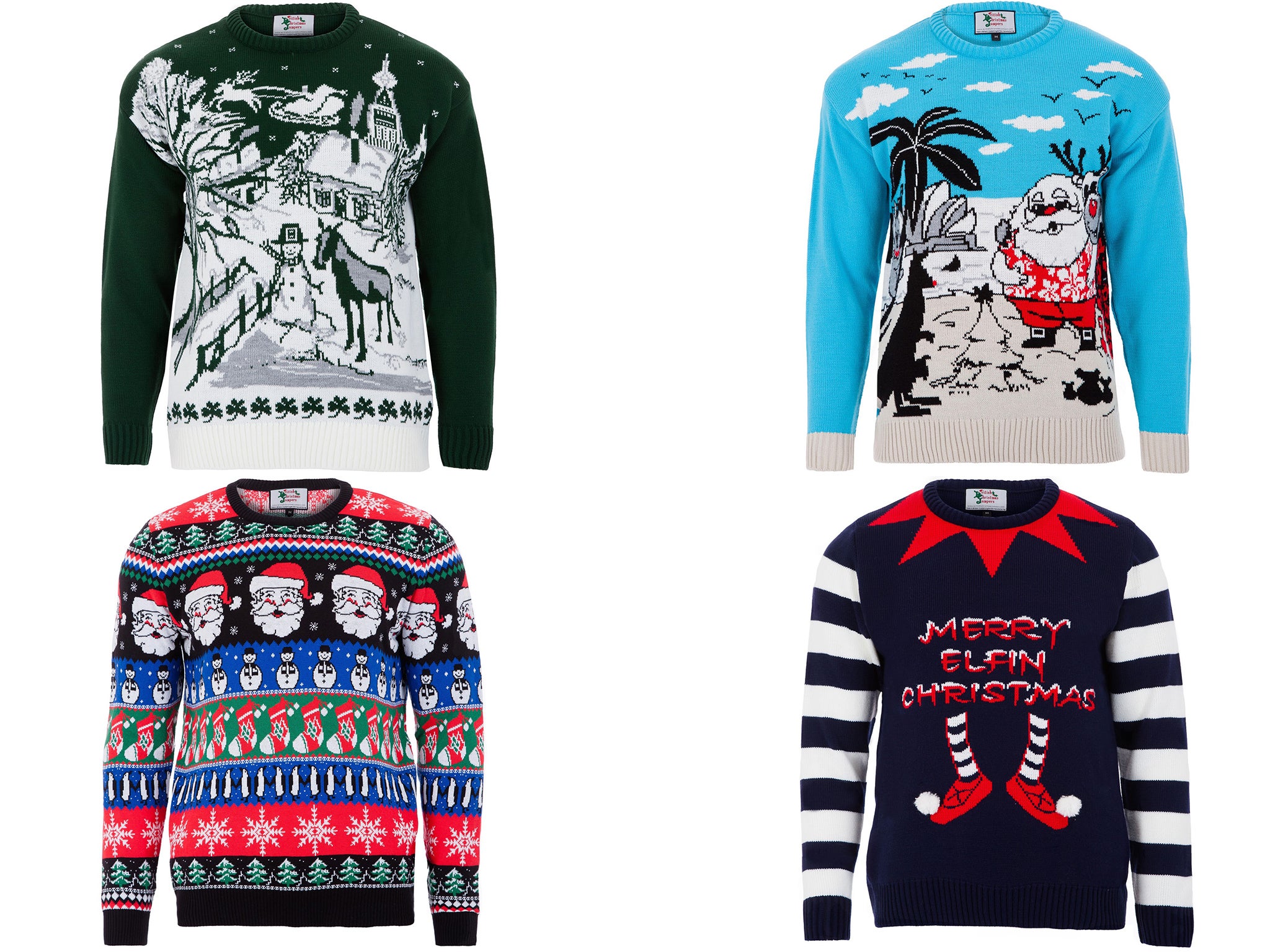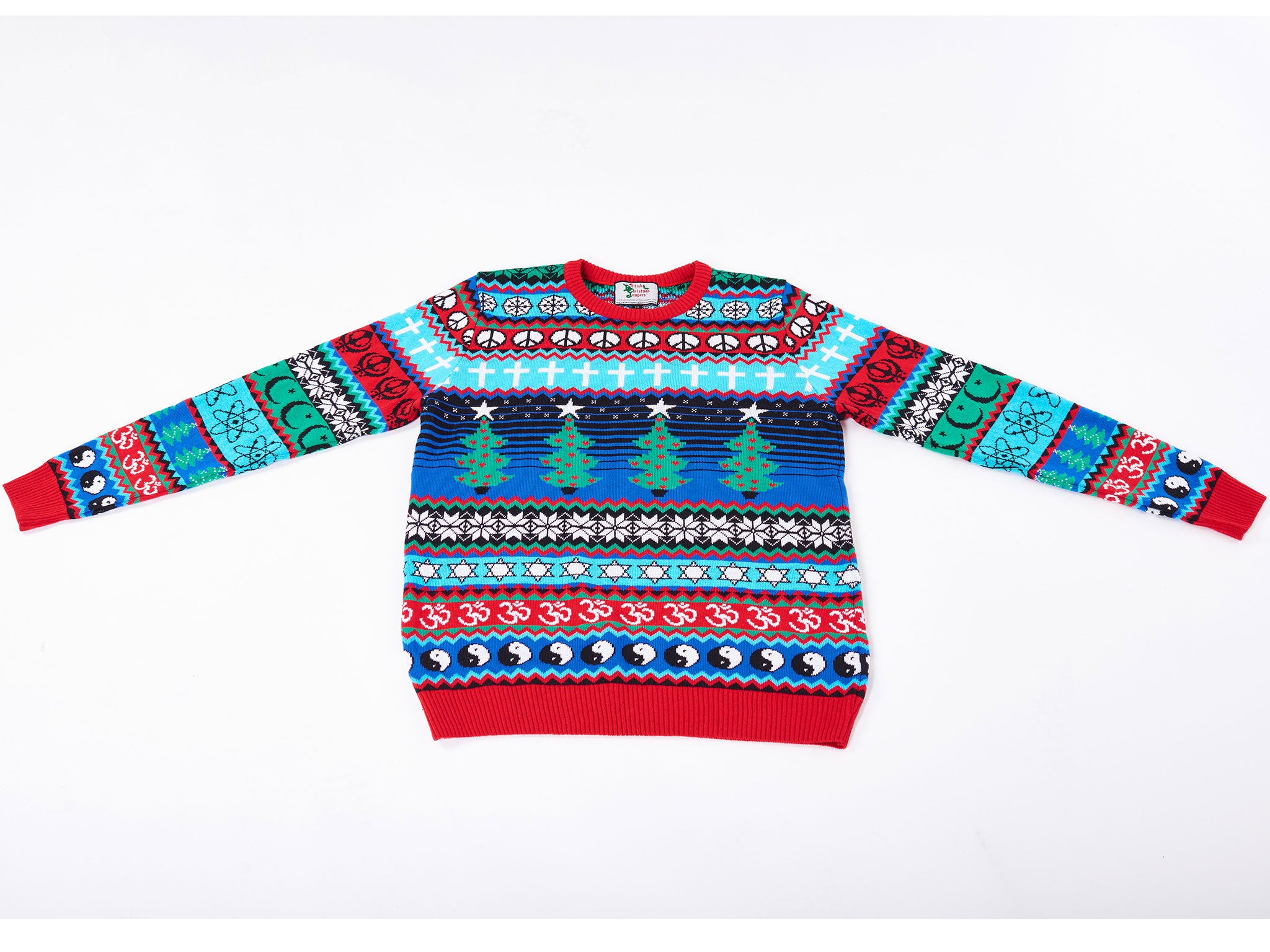Christmas jumper craze: Inside the UK factory behind this year's multicultural must-have
Christmas jumpers used to be unwanted gifts from an embarrassing relative. Not any more. Simmy Richman visits Jack Masters, the company behind the British Christmas Jumpers brand

Your support helps us to tell the story
From reproductive rights to climate change to Big Tech, The Independent is on the ground when the story is developing. Whether it's investigating the financials of Elon Musk's pro-Trump PAC or producing our latest documentary, 'The A Word', which shines a light on the American women fighting for reproductive rights, we know how important it is to parse out the facts from the messaging.
At such a critical moment in US history, we need reporters on the ground. Your donation allows us to keep sending journalists to speak to both sides of the story.
The Independent is trusted by Americans across the entire political spectrum. And unlike many other quality news outlets, we choose not to lock Americans out of our reporting and analysis with paywalls. We believe quality journalism should be available to everyone, paid for by those who can afford it.
Your support makes all the difference.They have gone from "You really shouldn't have" to "the season's must-have" in the space of a few years. About half of us now admit to owning one and retailers report a 200 per cent increase in sales from 2013. They are Christmas jumpers, those sartorial signifiers that, for the holiday season at least, we have all suddenly become more than happy to set free our inner Gyles Brandreth. The tipping point (or should that be knitting point) can be traced back to 2011, when Amazon reported a 600 per cent increase in sales from the previous year.
This surge of interest has led to a media that is annually hungry for a garish knitwear angle. Save the Children duly supplied one in 2012 by announcing its first Christmas Jumper Day. Last year, it was the turn of Asda, with its "flickering fire" number inspiring headlines such as "Is this the best (or worst) Christmas jumper ever?" And this year we have had any number of fabulous light-up jumpers. But even Primark's flashing elves beauty could not match the story of the world's first "multicultural" effort, which is either "the ultimate message of peace and joy" or "political correctness gone mad", depending on your point of view.
Look closely at the multicultural Christmas jumper, though, and it is not just the migraine-inducing design that might catch the eye. Because the label on the neck tells its own surprising story: "British Christmas Jumpers" it proudly proclaims, "Made in Britain – Supporting British Manufacturing".
It is highly specialised, time-consuming and technically intricate work to produce knitwear with patterns or designs. The latest hi-tech knitting machines from Japan take 45 minutes to churn out the front and back section alone; the sleeves are cut by hand and the collars have to be attached by one person feeding each jumper into a separate machine by hand.
For that reason – and because of the death of British manufacturing in general – most of the Christmas jumpers you will find in high-street shops are made overseas, most often in China. One of the few UK factories left that can respond to this recent surge in demand is called Jack Masters, and it is the family behind this knitwear label that is also responsible for the British Christmas Jumpers brand.
In the 1700s, Leicester was one of the "workshops of the world" and textile and knitwear manufacture was the bedrock of a thriving economy. The boom continued through the 1970s and early 1980s as a fresh wave of immigrants arrived in the city looking for work in the rag trade. Then, when local labour became the expensive option, Leicester's textile industry went into decline and now the vast majority of the once buzzing factory buildings lie eerily abandoned.
In the city's Aylestone area, many of these vast, empty spaces stand alongside the terraced houses that were once home to the workers. It is a grim November morning and, as I await entry to the Jack Masters factory, a rat runs across the closed delivery bay door of the empty building across the street.
Once inside, it is a different story. Founded in 1987 by Dilip Patel, a bio-technologist from India who came to the UK in 1981, Jack Masters is a knitwear manufacturer that employs about 40 people, including Dilip's wife Illa and the couple's two sons, Bhavik (who is also a qualified doctor) and Snahal (who has worked for Accenture).
A couple of years ago, the family realised that in order to survive, their factory needed to branch out from supplying knitwear to retailers. This desire to sell directly to the public saw the birth of the British Christmas Jumper brand.
Bhavik and Snahal are savvy second generationers and about five weeks ago they realised that, if their family's Christmas jumper label was going to take off, they needed some help in spreading the word. A quick Google search later and the pair had found a London-based digitally-led creative consultancy called Jam. As the two teams discussed how best to raise the label's profile, the multicultural Christmas jumper was born.

"The press coverage has been fantastic," Bhavik says, reaching for a recent copy of the Daily Star, which is none too flattering about their creation. "The only problem we have now is how to better this next year." Someone suggests trying to get a picture of David Cameron wearing one. Someone else mentions that a photograph of Nigel Farage in the multicultural Christmas jumper would be publicity gold.
And indeed it would. Because what better illustrates the problem of Farage's policies on immigration than a thriving and proud British manufacturer founded by an Indian man who arrived here at the very moment race riots were engulfing Britain's major cities?
Join our commenting forum
Join thought-provoking conversations, follow other Independent readers and see their replies
Comments